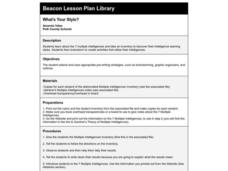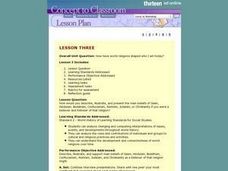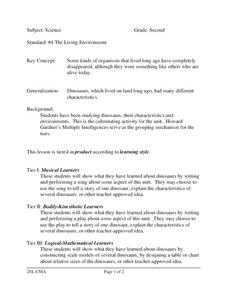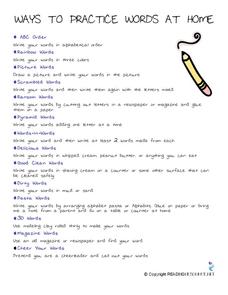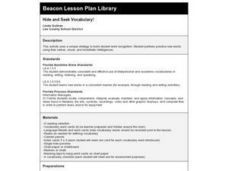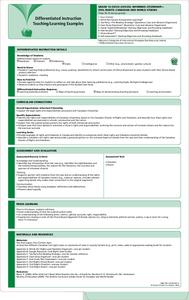Curated OER
The Greedy Dog
Teach young mathematicians the concepts of greater than, less than, and equal to with kinesthetic, visual, verbal, and numeric approaches. In a playful session that addresses multiple intelligences, your class will: dramatize a greedy...
Curated OER
What's Your Style?
High schoolers examine and discuss the seven multiple intelligences. They take an inventory to identify their own learning styles and design activities that utilize their intelligences.
Curated OER
Reviewing With Games
Change up your review strategies to reduce testing anxiety and appeal to multiple intelligences.
Curated OER
Bean Teasers
In this worksheet, students will examine the number of beans, to numerically calculate and the number of beans and place the beans in its proper place in each space. This worksheet would best be used with second and third graders. Who...
Curated OER
Multiple Intelligences Holistic Plan
Ninth graders apply basic algebra concepts to equations using cognitive, affective, and kinesthetic components. They create their own word problem, perform the story problem using a dramatic presentation, and present the problem to the...
EngageNY
Understanding Themes in Esperanza Rising
Determining a theme or central idea is greatly emphasized in the Common Core standards. Target that skill though big metaphors and central symbols in Pam Muñoz Ryan's Esperanza Rising. Help your class reach the standard through...
Curated OER
Body / Kinesthetic & Visual / Spatial
Tenth graders produce a multimedia project using HyperStudio. This project is similiar to an "information kiosk", with engaging media to "tell a story" about the Battle of Gettysburg. They have knowledge about the Civil War events that...
Curated OER
Estamos en la granja (We are on the farm)
Students receive a blank farm scene and a baggie of animal cutouts with names on them. They sit back to back so they cannot see each other's farm scene, then place 3-4 animals on their farm scene. They ask each other if their animal is...
Curated OER
Lesson Three
Students describe, illustrate, and present main beliefs of Islam, Hinduism, Buddhism, Confucianism, Animism, Judaism, or Christianity religion. They share with a partner their most significant fact about each leader interviewed. Students...
Curated OER
The Living Environment
In this reading comprehension lesson, 2nd graders have the choice between musical, kinesthetic, logical mathematical and verbal linguistic options to display their knowledge. Students can write a song, perform a play, construct a model...
EduGAINs
Introduction to the Great Depression—Canadian and World Studies
Ah, the classic business cycle model: recession, depression, recovery, prosperity. And then there was the Great Depression. Groups investigate the economic conditions that led to and social movements of the 1920s that great out of the...
Reading Resource
Ways to Practice Words at Home
Looking for more ways to practice writing words? A list of 27 strategies will engage learners of any level. Kids can choose between writing their words in peanut butter, criss-crossing them with words that share common letters, and...
Curated OER
Music and Movement
Students demonstrate how to instruct a Pre-K class in singing and creative movement. Once they are grouped according to several nursery rhymes, they practice singing the songs and coordinating appropriate movements with the rhythm. The...
Curated OER
SEXUAL LIFE CYCLE DEVELOPMENT USING MONOCYSTIS
High schoolers perform a lab to becoe familar with scientific concepts. The skill of inquiry is essential and this lesson furthers its development. The intelligence of kinesthetics is used as learners perform the many aspects of this lab...
Curated OER
Y-Intercept and Slope Intercept Form
Alegebra amateurs identify the slope and the y-intercept given a linear equation in slope-intercept form by correctly completing some in class problems. They write the linear equation in slope-intercept form that corresponds to the given...
Curated OER
Yummy Gummy Subtraction
Here is a quick 15 minute lesson intended to introduce subtraction. Learners count and subtract gummy bears to complete 5 problems. The lessons suggest that the gummy bears can be saved and used the next day, but gummy bears get gross...
Curated OER
Things in a Line
Little learners recognize symbols, objects and how to depict numbers. For this matching lesson, they can match the number names with a set of items, model ordinal numbers, and complete a cute, cartoon-character worksheet.
Curated OER
Hide and Seek Vocabulary!
Third graders practice word recognition and vocabulary building. They find word cards in the classroom. Then they practice reading the words and using them in sentences. Additional practice is gained by writing the words and using them...
Curated OER
The Changing Me
Third graders study the human body. In this health lesson, 3rd graders discuss that everyone's body is growing, measure body parts using a tape measure, and color the body worksheet.
Curated OER
Sounding Out CVCE Words
First graders explore vowels and consonants by participating in a flash card activity. In this phonetics instructional activity, 1st graders discuss the difference between short and long vowels and identify them within a story told to...
Ontario
Informed Citizenship—Civil Rights
To launch a study of civil rights, class members brainstorm rules and expectations of behaviors at home, in school, in the workplace, and in sports. They then look at civil rights cases and examine the rules embedded in these cases.
Curated OER
Math, Fractions, and Music
Students discover the relationship between musical rhythms and fractions. They add musical notes together to produce fractions and create addition and subtraction problems with musical notes. Students complete worksheets and create their...
Curated OER
History of Ponce de Leon in Florida
Based in sound Educational Theory, this instructional activity uses art to convey the story of Ponce de Leon. Mild to moderately disabled students hear the story of the Fountain of Youth, examine a paining of Ponce de Leon, and act out a...
Lerner Publishing
Living or Nonliving
It's alive! Or is it? Through a series of shared readings, whole class activities, and independent exercises children explore the difference between living and non-living things, creating a pair of printable books to demonstrate their...



